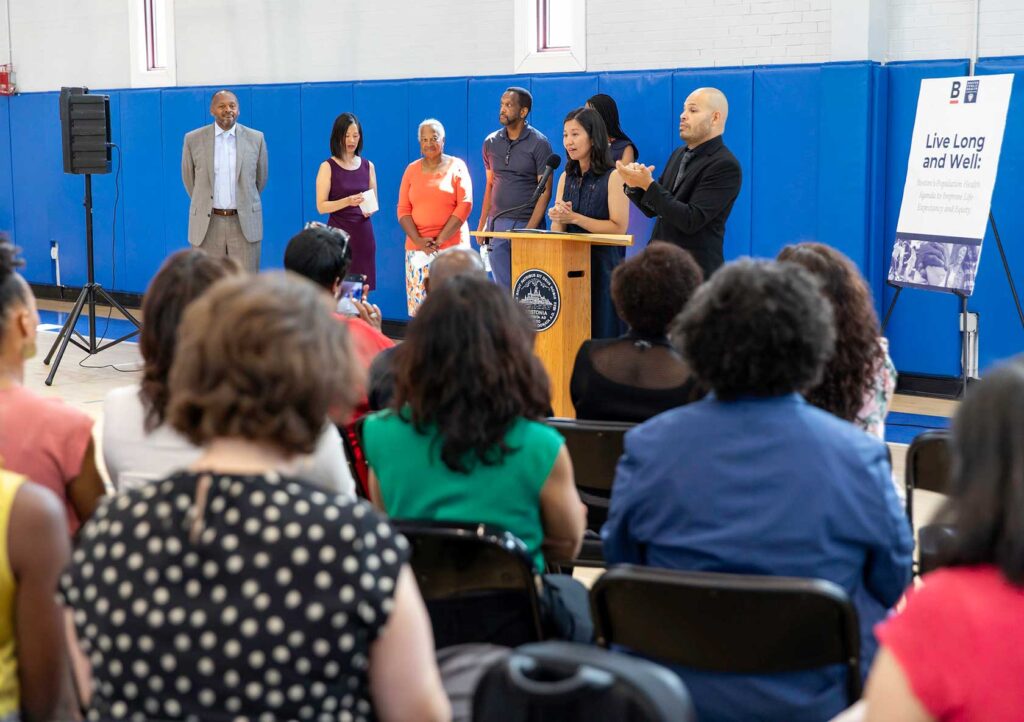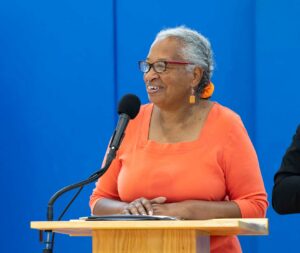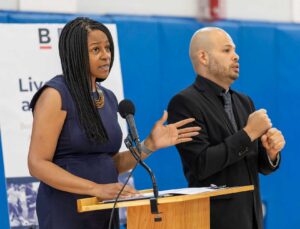
For the 35 years she’s lived in Mattapan, Vivien Morris has centered local health and wellness in her life and work.
This focus led her to found the Mattapan Food and Fitness Coalition and the Edgewater Food Forest and to join groups like the Boston Community Health Collaborative as a community resident representative.

Vivien Morris: “The health of my community has always been a central part of my life, a reason for building closer relationships with neighbors and then collectively advocating for change.” PHOTO: Mike Mejia, Mayor’s office
“The health of my community has always been a central part of my life, a reason for building closer relationships with neighbors and then collectively advocating for change,” she said at a city press conference held last week to discuss new efforts to address life expectancy disparities in Boston.
And, for residents across the city, that change is needed. Data released by the Boston Public Health Commission found that Mattapan and other neighborhoods with large populations of color tend to rank at the bottom for health issues like heart disease, diabetes, preventable cancers and opioid overdoses — the leading causes of premature mortality in the city.
Those gaps were highlighted last year when a report from the Boston Public Health Commission found a 23-year life expectancy gap between a census tract in Back Bay and another tract in Roxbury, two miles away.
By overall neighborhood, Mattapan had the lowest life expectancy at 77.3 years, five-and-a-half years shorter than neighborhoods downtown, and Dorchester and Roxbury were not far behind.
Now, through a new initiative announced at the July 10 press conference — called the “Live Long and Well Health Equity Agenda” — the city, in partnership with the Boston Public Health Commission and other organizations, is launching new efforts, starting first with an attempt to tackle heart disease and diabetes and accompanied with a call for more funding and support to take the mission further.
“The difference between Back Bay and Roxbury isn’t just distance. It’s income, it’s parks and green spaces, it’s access to healthy and affordable food, education and opportunities,” said Mayor Michelle Wu during the announcement of the new effort. “Our health equity agenda is designed to take these gaps on directly and to build on all the work that’s already happening in communities, across every department in the city, every neighborhood across Boston, so we can truly be a city where every family is flourishing.”
That agenda, which will also highlight efforts on preventable cancers and drug overdoses, will be a break from business as usual, officials said.
“We know that we need to do something more, and probably something different,” said Dr. Bisola Ojikutu, who heads the Boston Public Health Commission, in her remarks.
Beyond hospital walls
The work comes after average life expectancy in the city, which dropped by up to four years during the COVID-19 pandemic — depending on gender and racial demographics — largely rebounded, but still left gaps by racial demographics.
“They’re not just data points, they’re not just numbers. We’re really talking about people. These are our neighbors who live in our communities, who are dying earlier than they should be from heart disease, from diabetes, from drug overdoses and preventable cancers,” Ojikutu said.
And the work aims to go beyond hospital walls in addressing the issue, both to engage community members and groups already working on these issues and to make changes to social determinants of health — things like economic mobility, access to housing, food, green spaces and education that can impact the health of an individual or community.
“These are the factors that significantly contribute to health and wellness in Boston and beyond,” said Ojikutu.
That work continues a trend in how Ojikutu has led the commission since she took over in 2021. Community engagement and a focus on social determinants of health have been priorities for her in the leadership role, and have been key to an approach to citywide public health that has garnered strong support from other public health leaders in the city and state.
A team effort
The new Boston effort will rely on collaboration between officials and other groups. The city and public health commission are teaming up with the Boston Community Health Collaborative — a coalition that brings together health organizations and community voices — and funders to support efforts to address the health concerns that have some of the greatest impacts on premature mortality in the city.
The first push will use a $10 million contribution from the Atrius Health Equity Foundation to fund grants for efforts to support needs around cardiometabolic diseases like heart disease and diabetes.
“Being able to live a long and healthy life shouldn’t depend on your wallet or where you live — but right now, right here in Boston, as well as across our Commonwealth, it does,” said Dr. Ann Hwang, the president of the Atrius Health Equity Foundation, at the press conference.
According to data from the Boston Public Health Commission released in 2023, hypertension and hospitalizations for heart disease were more prevalent among Black and Latinx communities in the city.
The commission found that the prevalence of diabetes, too, was higher in communities of color. According to a 2023 report, about 15% of Black residents and 13% of Latinx residents had diabetes. Among white residents, that number was about 5%.
According to those reports, Roxbury, Mattapan and the southern parts of Dorchester saw higher mortality related to both heart disease and diabetes, compared to the city as a whole.
The parameters for the grants, which the commission said will be open for applications as soon as this fall, will include a focus on economic mobility, something the Boston Community Health Collaborative’s 2022 Community Health Improvement Plan identified as a critical strategy to improve health. Research has found that lower socioeconomic status is linked to worse cardiometabolic health.
While the specifics of the grant are still in development, a spokesperson for the Boston Public Health Commission said the funding will broadly be directed toward helping residents, especially those at heightened risk for cardiometabolic disease, meet basic needs, find increased support for wealth-building opportunities and navigate health care and social support systems that can often be complex and present barriers.
The city is planning to launch more initiatives, including ones focused on preventable cancers and opioid overdoses — in addition to efforts already underway, like its overdose reduction grant launched this spring — and are seeking new partnerships to support those efforts.
More is still needed
Even among the celebration of the agenda’s launch, Ojikutu called for a reality check.
“We know that this amount of money is wonderful, but it isn’t sufficient to address the gaps that are present in our city,” Ojikutu said.
She said she hopes the investment from the Atrius Health Equity Foundation will catalyze new support from other partners.
“What we know is, if we want to create change, we need collective action, we need to bring current activities to scale, we need to bring in new funding and we need to work collectively toward a common goal of closing the life expectancy gaps in Boston,” she said.







